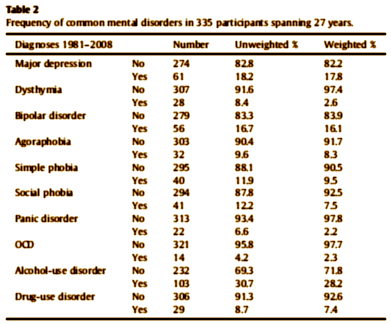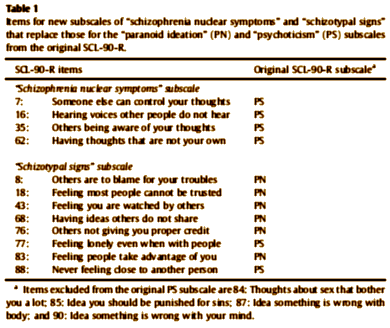Psychosis Risk Strikes Out Yet Again
New Study Shows It Doesn’t Predict Psychosis
Psychology Today: DSM5 in Distress
by Allen J. Frances, M.D.
January 5, 2012
DSM 5 continues to propose inclusion of a ill conceived and ill named new disorder variously labeled ‘psychosis risk’ or ‘attenuated psychotic symptoms’. It is long past time for this risky proposed diagnosis be dropped from consideration. Previous studies showing that psychosis risk does not predict psychosis have just received ringing confirmation and there is really nothing attenuated or psychotic about the people who are so misidentified. In the September Issue of Schizophrenia Research, Rössler et al report the results of a large [n=591], 30 year, well conducted longitudinal study on 18-20 year olds drawn from the general population. They evaluated initially for psychotic risk type symptoms [eg blaming others, lack of trust, believing others don’t give proper credit, loneliness, and never feeling close to anyone, etc] and then performed repeated follow-ups to see if these predicted the later development of schizophrenia. The resounding answer – not at all…
Sub-clinical psychosis symptoms in young adults are risk factors for subsequent common mental disorders.
by Rössler W, Hengartner MP, Ajdacic-Gross V, Haker H, Gamma A, and Angst J.
Schizophrenia Research 2011 131[1-3]:18-23.
BACKGROUND: Not all persons identified in the early stages to be at risk for psychosis eventually cross the threshold for a psychotic illness. However, sub-clinical symptoms may not only indicate a specific risk but also suggest a more general, underlying psychopathology that predisposes one to various common mental disorders.
METHODS: Analyzing data from the prospective Zurich Cohort Study, we used two psychosis subscales – "schizotypal signs" and "schizophrenia nuclear symptoms" – derived from the SCL-90-R checklist that measured sub-clinical psychosis symptoms in 1979. We also assessed 10 different diagnoses of common mental disorders through seven interview waves between 1979 and 2008. This 30-year span, covering participant ages of 19/20 to 49/50, encompasses the period of highest risk for the occurrence of such disorders.
RESULTS: Both psychosis scales from 1979, but especially "schizotypal signs", were significantly correlated with most mental disorders over the subsequent test period. Higher values on both subscales were associated with an increasing number of co-occurring disorders.
CONCLUSIONS: Our data demonstrate that sub-clinical psychosis generally represents a risk factor for the development of common mental disorders and a liability for co-occurring disorders. This refers in particular to dysthymia, bipolar disorder, social phobia, and obsessive-compulsive disorder. Proneness to psychosis could signal a fundamental tendency toward common mental disorders.
This longitudinal Swiss study found no cases developed Schizophrenia in this fairly large group of subjects who would have qualified for the Attenuated Psychosis Syndrome:
"… the information assessed and analyzed here relied on self-report instruments, for which responses might have been biased by omissions or intentional concealment. Nevertheless, because all of the data collected were held in strict confidence, we choose to assume that most reports were reliable. And finally there was no clinical interview concerning psychosis with the exception of the 2008 interview wave. From the data obtained from the last assessment wave, we can say that in 2008 none of the participants fulfilled the necessary criteria of a diagnosis of schizophrenia. But overall, we believe that our examination makes a valuable contribution to on-going discussions in this field of research. "
I doubt anyone would question that people who develop ‘psychotic-like’ symptoms early in life are prone to have a life punctuated by psychological illness of some sort. This study actually documents that point:

But notice that Schizophrenia isn’t on the list. Here are the symptoms from the scales used in 1979 when this study originated:

Kudos to Dr. Frances for locating it. This is exactly the kind of study we ought to be doing. The conclusions are grounded in data, not "expert opinion" or speculations from the realm of future-think [fantasy]. The breadth of symptomatic outcomes also speaks to a point I was trying to make in the last post. In the field of psychiatry, the conditions are not so fixed as in physical medical specialties. What one can say about people with these "schitzy" symptoms is that there’s trouble down the road, but that’s about all. They’re apparently not signs of impending Schizophrenia, but they are signs of something being awry. It’s part of the reason that the DSM system of diagnosis is so haywire. They’re trying to squeeze psychiatric illness into a classificatory system that is appropriate for something else…
Sorry, the comment form is closed at this time.